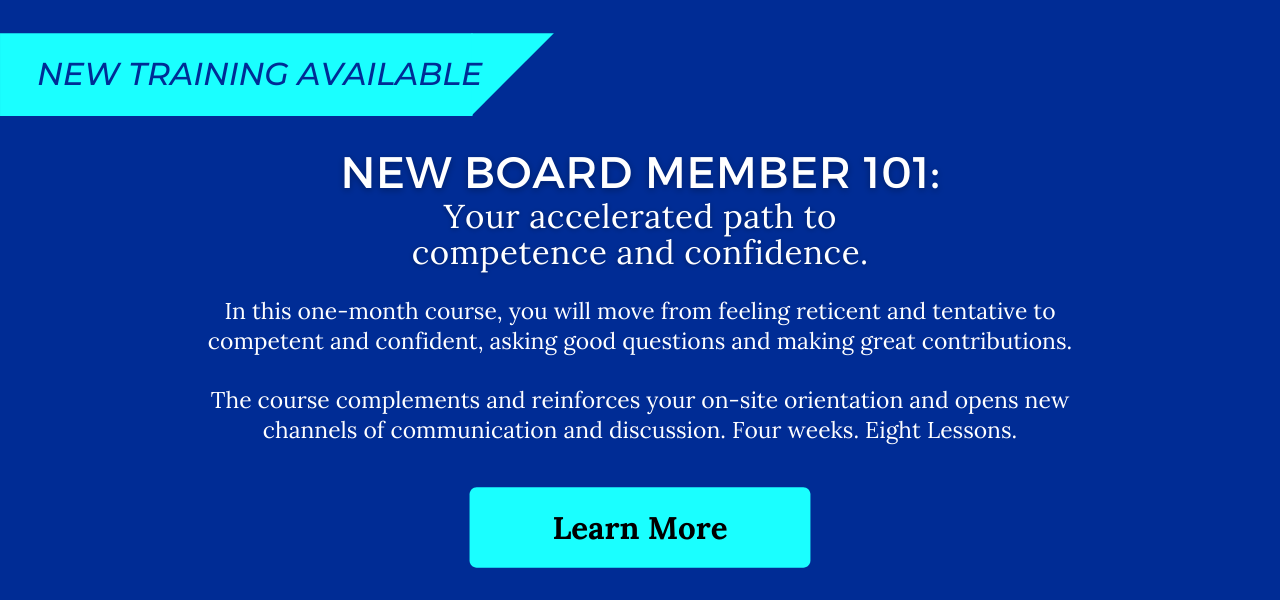10 Critical Questions Boards Need to Ask Themselves: Move Your Board from “Not-for-Profit” to “For Impact”
Jun 08, 2021
Every board has issues.
Now, to state the obvious, every board is comprised of individuals, and every individual also has a few issues -- so should this be a surprise to anyone?
However, not every board is sufficiently self-aware to recognize how they might improve. Sometimes we have a small problem, sometimes it is a systems problem; sadly, there is rarely a time or process for us to reflect, analyze, and correct.
At one time I gave many presentations on the 10 Mistakes that Most Boards Make. It was very popular! But it also generated much criticism until I changed “mistakes” to “questions” that boards need to ask. Apparently, none of us make mistakes, we just have questions to ask. I must be the exception.
I must admit that I have always believed: You don’t need to be sick to get better.
So here are my 10 Critical Questions Boards Need to Ask Themselves for you to consider. Many of them would be useful topics for conversation around the Board table.
You can get our more detailed document as a pdf here.
A Brief Summary of the 10 Critical Questions
Here is a brief summary of 10 Critical Questions Boards Need to Ask Themselves and how to move your Board from “not-for-profit” to “for impact.”
Our theme is Governance as Leadership. We’ll explore each of these questions in greater depth over the coming weeks.
1. Why are you here?
What do you hope to accomplish to improve your community? You must want to make a difference: what is it?
2. Who is your employee?
How do you develop your critical partnership with the Chief Executive Officer (by whatever name, e.g., Executive Director)? How do you manage one person through policy, not every employee through micromanagement?
3. What is your role?
Of course, there are many, many responsibilities for boards but there only four areas that are the essence of board leadership and unique to you – plan strategically, engage the CEO to implement the plan, get the resources to support the mission, evaluate for outcomes and impact.
Do your Board work plan and committee structure reflect your unique responsibilities (policy, planning, governance, sustainability, assessment/audit) or those of management (finance, human resources, marketing, etc.)?
4. Why are you meeting?
Do you have agendas of consequence, focusing on strategic and forward thinking and planning, or just reports on what someone did last month?
Does your strategic plan drive your agenda?
5. How do you ensure sustainable resources?
Do you have a plan for advocacy and influence? This is critical to ensure sustainable resources to achieve your mission.
How do you work with your primary funder(s)? What is your plan for sustainability?
6. What are your KSFs?
Are your Key Success Factors (KSFs) written and measured?
Do they advance your mission?
7. How do you manage risk?
What are your values and mechanisms for oversight, including conflict-of-interest policies?
8. How do you ensure transparency?
Are you legal? Working within legislation and regulations?
Is each board member financially literate? What are your mechanisms for active oversight?
How can a community member review your annual reports?
9. How do you foster a culture of inquiry and assessment?
How do you move to high performance, avoiding a culture of “niceness,” conflict-avoidance, and victimization?
10. How do you continue to improve?
How do you assess your performance and value? How do you act on it?
Which of these is most challenging for your Board?
Please comment below – this also helps to inform our investigations and future posts!
At a fairly high level, these questions cover every aspect of board performance. If you are working with or on a board with challenges, they can appear daunting. But they need not be.
Start with one. Start the conversation.
No guilt. No shame. No finger-pointing. Just an interest in improvement.
And remember again: you don’t have to be sick to get better.
Continual improvement enables us to make a difference and have an even greater impact on the quality of experience in our communities.
You can get more of my thoughts on Facebook and LinkedIn.
Join our Facebook Group for Executive Directors and Board members: Governance as Leadership.
P.S. May I ask a tiny favour?
Would you mind sharing this blog with one person? I would love it. You can post the links in your Facebook Groups, LinkedIn or even send an email.



